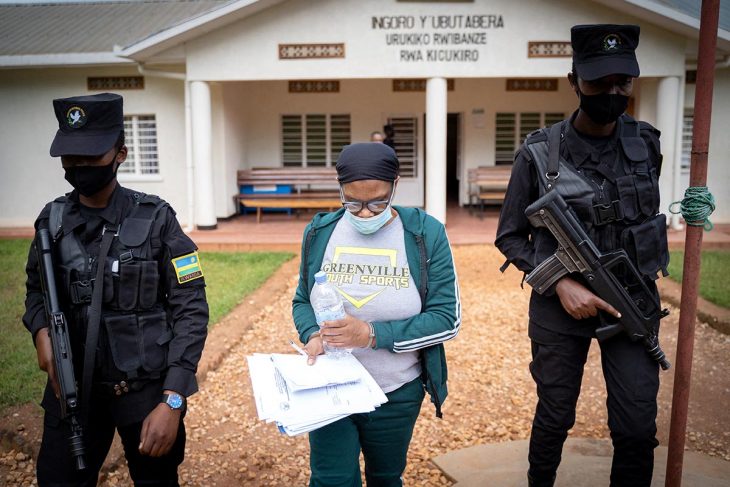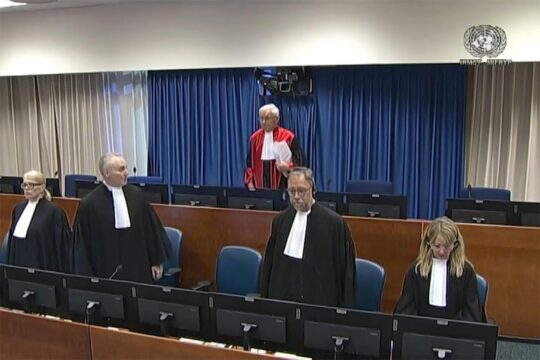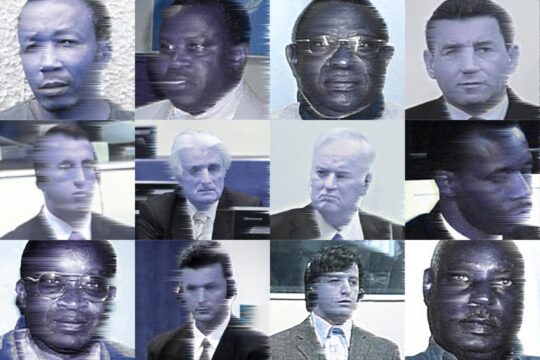On the evening of April 16, 2021, in the midst of commemorations of the 1994 Tutsi genocide, the Rwandan press was crowding the Kigali international airport. Were they waiting for a distinguished guest? No, it was a woman in a tracksuit who disembarked from the plane: Béatrice Munyenyezi, extraditedfrom the United States to face Rwandan justice for her alleged role in the genocide. The mother of three children — the first woman to be sent back to Kigali by the US, after being convicted for having lied to immigration authorities to obtain first asylum and then US citizenship – is the daughter-in-law of Pauline Nyiramasuhuko, the only woman to have been indicted, tried and convicted by the former International Criminal Tribunal for Rwanda (ICTR), along with her son Arsène Shalom Ntahobali (editor's note: some write Ntahobari).
Loyalty to President Habyarimana
Nyiramasuhuko was born in 1946 to a peasant family in the commune of Ndora, in the former prefecture of Butare, southern Rwanda. Her childhood was marked by an event in her family's history: a migration due to lack of food or famine. Her father had to go into exile in Tanzania at the end of the Second World War in search of a livelihood. In 1959, at a time when parents were reluctant to send their daughters to a white school, Pauline entered the Karubanda Social School where she rubbed shoulders with the future wives of post-independence leaders. Ministers, MPs and army officers rivalled each other for one of these girl graduates, preferring them by far to teachers or nurses. The number of study courses open to girls was very limited.
After Karubanda, she began a long career in the field of social affairs. In 1986, in her forties, Nyiramasuhuko went back to school and joined the National University of Rwanda (UNR) in Butare, where she studied law and graduated with a degree in 1990. A year later, President Juvénal Habyarimana, under the double pressure of domestic opinion and the rebellion of the Rwandan Patriotic Front (RPF), legalized the multiparty system. Many intellectuals from the south joined the opposition. But the very loyal Nyiramasuhuko remained in the ranks of the ruling National Republican Movement for Democracy and Development (MRND). At the time, however, she was little known, even though her husband, Maurice Ntahobali, also from Butare, was rector of the National University of Rwanda, after having been a minister and president of the National Assembly.
Minister of Women’s Affairs
It was in April 1992 that Pauline Nyiramasuhuko's name entered the political history of contemporary Rwanda: she was appointed, to everyone's surprise, Minister of Family and Women's Promotion in the first multiparty government. Two other women were part of this ministerial team: the Minister of Trade, Agnès Ntamabyaliro, and the Minister of Primary and Secondary Education, Agathe Uwilingiyimana.
Uwilingiyimana, a member of the main opposition party, the Mouvement démocratique républicain (MDR), later became Prime Minister before being assassinated on April 7, 1994 in the early hours of the genocide. For her part, Agnès Ntamabyaliro is now imprisoned in Rwanda after being convicted of genocide. Before the three of them, only one woman had served as a minister in this small country: Madeleine Ayinkamiye, who was briefly Minister of Social Affairs in 1964.
According to numerous Rwanda experts, including French sociologist André Guichaoua, Nyiramasuhuko owed her promotion to her friendship with President Habyarimana’s wife, Agathe Kanziga, herself a former student at the Karubanda school. Nyiramasuhuko denies this, saying it was based on her merit. Her post was renewed in 1993, and again in 1994, during the genocide. After the military victory of the Rwandan Patriotic Front (RPF), the former minister took refuge in Bukavu, in the east of the former Zaire, now the Democratic Republic of Congo (DRC). It was then that international human rights organizations began to raise questions about her.
The report "When Women become Killers" published in 1995 by African Rights is damning. "She began organizing the massacres (in Butare) even before the dismissal and murder of the (Tutsi) prefect Jean-Baptiste Habyarimana, who had managed to prevent the massacres during the first two weeks of the genocide," the organization reported. In an interview with the BBC, she protested strongly: "If someone says that a woman, that a mother killed, then I am ready to be confronted. The RPF has put the names of all Hutu intellectuals on its list," the minister declared.
Mother and son in jail in Dakar
In 1997, she was arrested in Nairobi, Kenya, and transferred to the ICTR for trial. In what was to be the longest trial of the tribunal, she appeared with her son Arsène Shalom Ntahobali, who went down in history as the youngest of the ICTR's convicts. Now imprisoned, like his mother, in Dakar, under an agreement on sentence execution between Senegal and the United Nations, Ntahobali junior was born in 1970 in Israel, hence his Hebrew name. His mother was a participant in an African women's seminar there when she gave birth.
Almost everyone in the small university campus in Butare knew “Shalom”, the son of Minister Nyiramasuhuko and Rector Ntahobali. As a student at the university, he had a social status that was naturally envied by his colleagues. Witnesses at the ICTR described him as a mediocre student, even a failure and "an ill-bred child," but his mother and sisters denied this. In their testimony, they denied that he had played any role in the genocide.
Incitement to rape on roadblocks
Just as their names were beginning to be forgotten, the family is back on the radar with the extradition of Béatrice Munyenyezi. Shalom Ntahobali's 51-year-old wife comes from a farming family in the Byumba prefecture on the other side of Rwanda. She entered the "big league" by marrying him in 1993. According to the Rwandan prosecutor's office, the following year she played a leading role in the genocide in Butare. She is said to have been present at roadblocks, galvanizing the Interahamwe militiamen, urging them, among other things, to rape Tutsi women and girls. "All of this is a lie," she claimed during her court appearance on May 5 in Kigali. "I was new in Butare and physically weak because I was pregnant. And I also had two twin babies to take care of. The Rwandan justice system has not started the substance of the trial. In the United States, on the other hand, a decision was handed down in 2013. Munyenyezi was sentenced to 10 years in prison and stripped of her US citizenship for having hidden her role in the genocide. Initially a refugee in Kenya with her mother-in-law and husband, she managed, after their arrest, to settle in the United States, with her three children.
Pauline, Shalom and Béatrice's reputation for brutality has overshadowed the father of the family, Maurice Ntahobali, who was a minister and then president of the National Assembly before being appointed rector of the National University in 1989. Although some sources in Rwanda accuse him of having had some of his Tutsi professors killed in 1994, his name is not mentioned as often as those of these other three members of the family. The mathematician now lives in Belgium.








